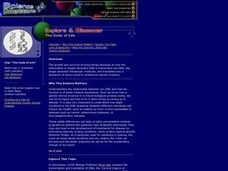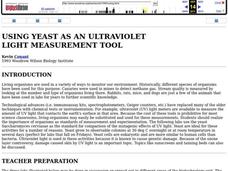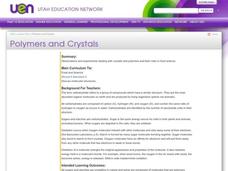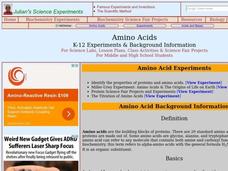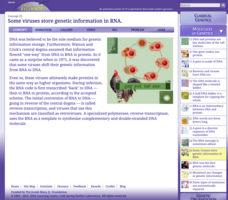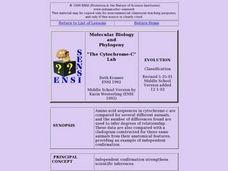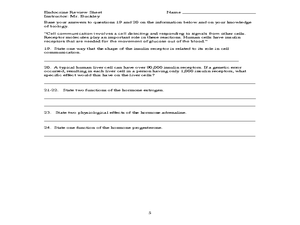Curated OER
The Code of Life
Students study genes, DNA and medical research. They watch "The Code of Life" video and answer discussion questions regarding the transcription and translation of DNA and how errors in these processes and mutations in DNA can produce...
Curated OER
Using Yeast as an Ultraviolet Light Measurement Tool
Students accurately measure the relationship between radiation dose and either survival or some genetic event such as mutation or recombination. They investigate the damage that was done to the DNA molecule as a result of exposure to...
Curated OER
Who Stole My Salad?
Eighth graders explain how protein is made in the cell. In this biology lesson, 8th graders translate RNA and DNA using an internet database. They determine the thief based on evidence collected.
Curated OER
Life Substance
In this life substances worksheet, high schoolers will review carbon atoms, monosaccharides, dissaccharides, polysaccharides, lipids, proteins, and nucleic acids. This worksheet has 4 true or false and 17 matching questions.
Curated OER
Polymers and Crystals: Their Role in Food Science
Blend chemistry with cooking in this exploration of polymers, carbohydrates, and food science. Experimenting with gelatin produces concrete examples of the bonding and ploymerization discussed in the lesson. Copious, comprehensive...
Curated OER
Pete And Repeat
Students draw a picture of a person from popular culture, then "clone" it using printing techniques in this Art lesson that tackles the questions surrounding cloning, DNA, and current scientific techniques. An emphasis is placed on the...
Curated OER
Amino Acids
Students explore what amino acids are, their history and how they are used in technology. In this protein lesson students identify the properties of proteins and amino acids.
Curated OER
Protein Synthesis
In this science related worksheet, students study, locate and answer ten multiple choice questions dealing with protein synthesis.
Curated OER
Homologous Shoes
Students examine the concept of homology by observing their shoes and those of their classmates. They summarize the observations of everyone's shoes relating it to chromosomes in cells. They share their observations with the class.
Curated OER
Molecular Approaches to Evolution
Students examine the molecular studies of organisms that have led to a new era in their understanding of speciation and evolutionary relationships. Students study the allelic frequency of genes controlling specific molecules and assess...
Curated OER
Molecular Approaches to Evolution
Students are introduced to working with molecular data. The first activity does both simulated and original data are used to compare amino acid, protein or DNA differences to construct phylogenetic trees or cladograms. These activities...
Cold Spring Harbor Laboratory
A Genome Is an Entire Set of Genes
Today researchers identify a gene suspected of causing a genetic disease in a matter of days rather than years, thanks to the Human Genome Project. Young scientists learn about the Human Genome Project and the scientists who designed the...
Cornell University
Bacteria Take Over and Down
Bacteria outnumber all other forms of life on Earth. Scholars observe the growth of bacteria in petri dishes to understand their role in maintaining good health. Then, they observe the growth of bacteria after they introduce...
Cold Spring Harbor Laboratory
Some Viruses Store Genetic Information in RNA
Can a high school program alter the entire course of your life? David Baltimore and Howard Temin participated in high school programs working in research laboratories and went on to win the 1975 Nobel Prize. Learn about these two...
Curated OER
Genetics 5 Technology
Learners, after studying extraction and gel electrophoresis, recombinant DNA, transgenic organisms, and reproductive cloning, summarize the main concepts in DNA technology. They analyze the applications of DNA: forensics, medicine,...
Curated OER
The Cytochrome-C Lab
Learners examine a method biologists use to try to determine relationships. They examine how amino acid sequences have been determined for a number of proteins, and how scientists can make inferences about DNA based on the amino acid...
Curated OER
Covalent Compounds
In this covalent compounds activity, students answer 8 questions about bonding in covalent compounds, covalent bonds, and diatomic molecules. Students draw 2 dot diagrams showing covalent bonding. They answer 4 questions about bacteria...
Serendip
Soap Opera Genetics – Genetics to Resolve Family Arguments
Did she cheat on her husband? Did the hospital switch the babies? Should they have children? As much as this sounds like the plot for a soap opera, all of these questions fit into a single lesson on genetics. Scholars read about three...
Curated OER
Cracking the Code - Cloning Paper Plasmid
Students explore the "genetic code." They observe how genes may be manipulated for genetic research, gene cloning, and genetic engineering. In a lab setting, students examine the mechanics involved in cutting and ligating DNAs into a...
Curated OER
Construction of a Hemoglobin Gene
Students see how eight pairs of triplets are equivalent to part of a gene and control a part of heredity. They comprehend how blood corpuscles manufacture normal hemoglobin. Students already comprehend that genes control the synthesis...
Curated OER
Chemistry
In this chemistry worksheet, students describe an atom, its parts, the charges of these parts, and atoms life functions. Then they explain what the octet rule states for the placements of electrons around the nucleus of an atom. Students...
Curated OER
USING YEAST AS AN ULTRAVIOLET LIGHT MEASUREMENT TOOL
Pupils realize the importance of organisms as standards of measurement and experimentation.The first lab is a simple survival curve that demonstrates the effects of UV light on cells. The second lab looks at repair mechanisms of the DNA...
National Institute of Open Schooling
Biomolecules
An informative lesson has learners read about, discuss, and study the classification, structure and importance of the following biomolecules: carbohydrates, proteins, lipids, nucleic acids, and enzymes.
Curated OER
Endocrine Review Sheet
Starting with a diagram of the kidneys and urinary tract of the human, this sheet has questions about excretion, blood concentrations of hormones, gland feedback mechanisms and the effects of some hormones.


